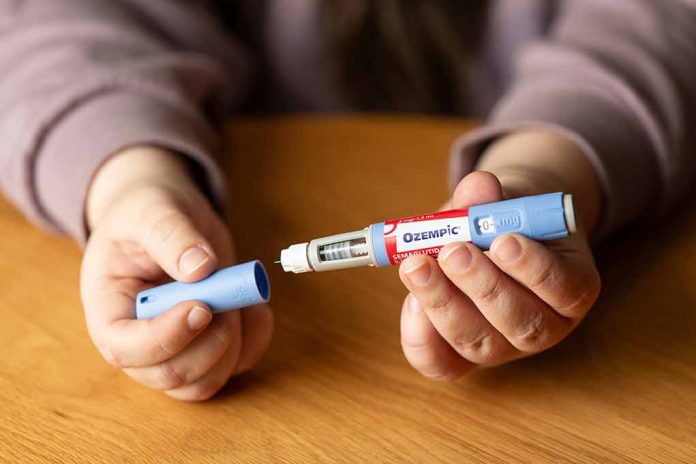
A World Health Organization (WHO) study has revealed a alarming link between a common weight-loss drug and a 45% increase in suicidality.
At a Glance
- WHO study suggests a 45% increase in suicidality with the weight loss drug semaglutide.
- The drug is found in popular medications like Ozempic and Wegovy.
- Regulatory agencies are reviewing the study’s findings for potential actions.
- Healthcare providers are urged to monitor patients for adverse psychological effects.
WHO Study Raises Alarms
The World Health Organization (WHO) has linked semaglutide, commonly used for weight loss and found in drugs like Ozempic and Wegovy, to a 45% increase in reports of suicidality. This information was uncovered through a disproportionality analysis of WHO data, which compared semaglutide’s adverse effects with those of other medications.
Regulatory bodies are now conducting reviews to determine if additional warnings are necessary. Currently, Wegovy’s label advises doctors to monitor for suicidal thoughts, a precaution not found on Ozempic’s label.
WHO Data: Weight Loss Drug Linked to 45 Percent Higher Suicidality
Study links semaglutide in Ozempic, Wegovy to increased odds of suicidal thoughts, urging further research.https://t.co/4cKlBytcb3
— The Epoch Times (@EpochTimes) August 21, 2024
Statistical Analysis and Findings
The WHO analysis showed a significant signal of suicidal ideation with semaglutide, particularly when compared to drugs like dapagliflozin. For patients also taking antidepressants and benzodiazepines, the risk was markedly higher (ROR, 4.45 and 4.07, respectively). Given the seriousness of these findings, immediate action and further investigation are required.
Healthcare Provider Vigilance and Regulatory Review
Healthcare providers are advised to be particularly cautious when prescribing semaglutide. An elevated rate of suicidality demands that mental health be closely monitored. Regulatory agencies, including the FDA and European Medicines Agency, are investigating these findings to assess whether new regulatory guidelines and warnings are warranted.
“Findings: This disproportionality analysis through the case-control design based on the World Health Organization global database collecting suspected adverse drug reactions identified a disproportionality signal of suicidal ideation with semaglutide, which remained significant when comparing semaglutide with dapagliflozin and metformin and in the subgroup of patients with coreported use of antidepressants and benzodiazepines.” Jama Network
Additional research is needed to understand if the suicidality risk is limited to specific patient subsets or if it is a broader issue. Semaglutide-based drugs like Ozempic and Wegovy are widely prescribed for weight management and type 2 diabetes, making this an urgent public health concern.
FDA evaluating miracle weight-loss drugs like Ozempic for suicide risk | Click the image to read the story https://t.co/DlwBgNvFbl
— KOMU 8 News (@KOMUnews) March 12, 2024
Implications for Patients and Doctors
Despite the alarming findings, it’s essential to remember that the overall rate of suicidal thoughts remains low, making up only 0.3% of all adverse reactions reported for semaglutide. No higher rate of suicidal thoughts has been observed with liraglutide, an older GLP-1 drug. Patients and doctors should balance the benefits and risks carefully.
Stephen Burgess, group leader at the MRC Biostatistics Unit at University of Cambridge who was not involved in the study, said in a statement that ‘the impact of losing a large amount of weight could have negative emotional consequences. If an individual thinks that losing weight is the key to happiness, but losing weight does not bring happiness, could this lead to depression and suicidal ideation?’”
The study also highlights a key concern: excluding patients with a history of suicidal behavior from clinical trials could underestimate the actual risk, making real-world monitoring crucial. More comprehensive studies are needed to better understand how patients, especially those with preexisting mental health conditions, respond to semaglutide.
Sources
- https://www.cnn.com/2024/08/20/health/semaglutide-suicide-study-wellness/index.html
- https://jamanetwork.com/journals/jamanetworkopen/fullarticle/2822453
- https://www.statnews.com/2024/08/20/glp-1-drugs-suicidal-ideation-jama-study-ozempic-wegovy-users/
- https://www.nbcnews.com/health/health-news/ozempic-wegovy-reports-suicidal-thoughts-rcna93919
- https://www.reuters.com/business/healthcare-pharmaceuticals/wegovy-other-weight-loss-drugs-scrutinized-over-reports-suicidal-thoughts-2023-09-28/
- https://www.washingtonpost.com/health/2024/01/11/fda-ozempic-wegovy-suicide-safety/
- https://www.nih.gov/news-events/news-releases/glutide-associated-lower-risk-suicidal-ideations-compared-other-treatments-prescribed-obesity-or-type-2-diabetes
- https://thedaily.case.edu/new-study-concludes-diabetes-and-weight-loss-drugs-ozempic-and-wegovy-not-associated-with-increased-risk-for-suicidal-thoughts/
- https://www.fda.gov/drugs/drug-safety-and-availability/update-fdas-ongoing-evaluation-reports-suicidal-thoughts-or-actions-patients-taking-certain-type
- https://www.thelancet.com/journals/eclinm/article/PIIS2589-5370(23)00059-7/fulltext










